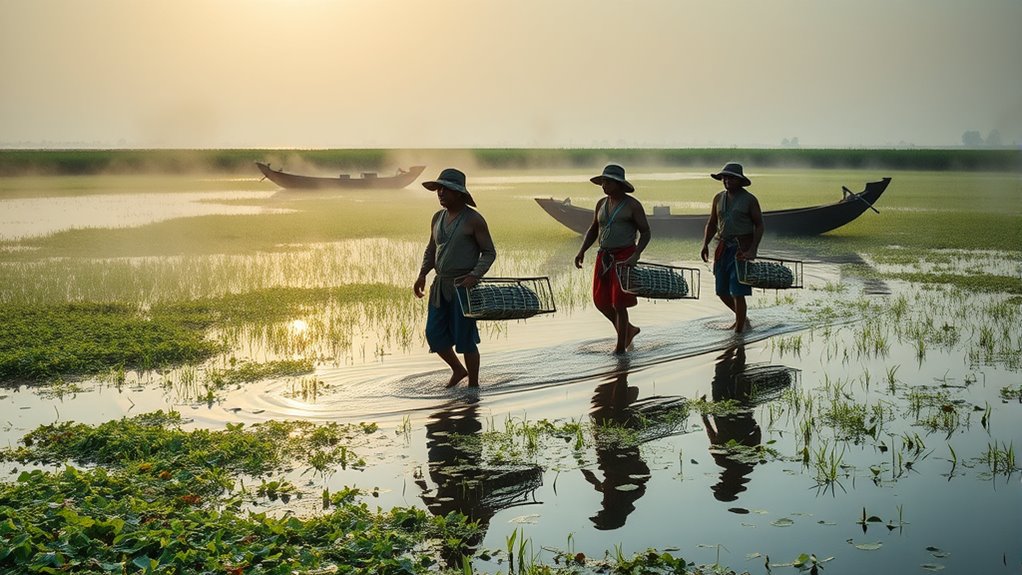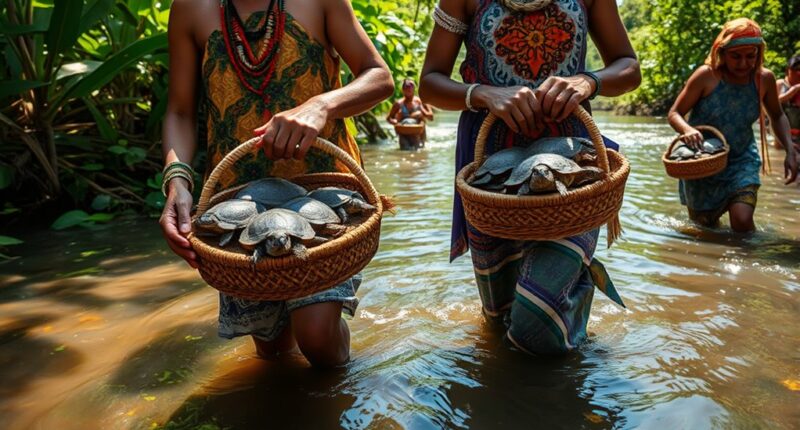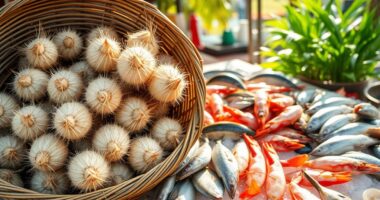Traditional turtle hunting is a essential part of many communities’ cultural heritage, but balancing it with conservation is indispensable. You can support sustainable practices by respecting regulations that protect turtle populations, understand seasonal limits, and value traditional ecological knowledge. Responsible hunting helps guarantee future generations can continue their heritage without harming the environment. If you want to learn how communities and laws work together to preserve these practices, there’s more to explore below.
Key Takeaways
- Traditional turtle hunting preserves cultural heritage while integrating sustainable practices to prevent overharvesting.
- Legal regulations set species, season, and method limits, balancing cultural needs with ecological conservation.
- Combining indigenous knowledge with scientific research helps establish effective quotas and no-hunting zones.
- Community involvement and education promote responsible hunting, ensuring cultural practices support turtle population health.
- A balanced approach maintains cultural traditions while protecting turtle populations for future generations.

Have you ever wondered how traditional turtle hunting has been practiced for generations? Indigenous communities and coastal populations have long relied on this practice not just for sustenance but also as a crucial part of their cultural heritage. However, as these traditions continue, there’s an increasing need to balance preserving these customs with the imperative of conservation. This is where sustainable practices and legal regulations come into play, guiding how turtle hunting is conducted today.
Sustainable practices are essential if you want to guarantee that turtle populations remain healthy for future generations. These practices involve understanding the breeding cycles, migration patterns, and population sizes of different turtle species. For example, hunters might limit their catches to specific seasons when turtles are less vulnerable or avoid certain habitats during critical breeding times. Such measures help prevent overharvesting, which can lead to population declines and disrupt the ecological balance. Communities that embrace sustainable practices often develop traditional knowledge, combined with scientific insights, to set quotas or establish no-hunting zones. This approach respects cultural traditions while promoting conservation, ensuring that turtles are not driven to the brink of extinction just to satisfy cultural or economic needs.
Embracing traditional knowledge and scientific insights helps set sustainable hunting practices that protect turtle populations.
Legal regulations further support the responsible practice of turtle hunting by setting clear boundaries and standards. Governments and environmental organizations often establish laws that define permitted species, hunting seasons, and the methods you can use. These regulations aim to prevent illegal poaching and habitat destruction, which threaten turtle populations worldwide. When you adhere to such legal frameworks, you’re not only respecting the law but also contributing to global conservation efforts. Many communities work collaboratively with authorities, recognizing that sustainable use of resources benefits everyone in the long run. These regulations are typically based on scientific research and local ecological data, making them more effective and adaptable to specific regional conditions. Incorporating traditional ecological knowledge into these frameworks can further enhance their effectiveness and cultural relevance.
Despite the restrictions, traditional turtle hunting remains a cultural cornerstone for many groups, and legal regulations often include provisions to protect these customs. When you follow these rules, you’re participating in a delicate balance—honoring your heritage while ensuring that turtle populations thrive. Education and community involvement are crucial, as they foster a shared responsibility for conservation. By respecting legal regulations and practicing sustainable methods, you help maintain the ecological and cultural integrity of turtle hunting. Ultimately, this balanced approach ensures that future generations can continue to appreciate and partake in this ancient tradition without compromising the health of turtle populations or the environment they inhabit.

FLERDMAU Snuffle Mat for Dogs – Interactive Puzzle Feeding Game for Stress Relief & Foraging Skills | Dog Toys to Keep Them Busy | Small/Medium/Large Dogs Turtle Design
Encourage Natural Foraging Skills & Mental Stimulation – Designed to mimic the natural foraging environment, this snuffle mat…
As an affiliate, we earn on qualifying purchases.
As an affiliate, we earn on qualifying purchases.
Frequently Asked Questions
How Do Local Communities Ensure Sustainable Turtle Harvesting?
You can guarantee sustainable turtle harvesting by embracing community management practices that respect their cultural significance. This means setting and following harvest limits, monitoring turtle populations, and enforcing seasonal restrictions. Your community plays a crucial role in balancing tradition with conservation, actively participating in regulations and education efforts. By doing so, you help preserve the cultural heritage while safeguarding turtle populations for future generations.
What Are the Legal Frameworks Governing Traditional Turtle Hunting?
You might wonder what keeps traditional turtle hunting in check. Legal regulations set strict boundaries, ensuring sustainability, while cultural exemptions recognize communities’ rights to hunt turtles for their traditions. These frameworks aim to strike a delicate balance—protecting species and honoring customs. Yet, enforcement varies, and tensions can rise. Staying informed about these legal rules helps you understand how conservation efforts coexist with cultural practices, safeguarding both heritage and wildlife.
How Does Turtle Hunting Impact Local Biodiversity?
You might not realize that turtle hunting can impact local biodiversity through bycatch effects, where unintended species get caught, and habitat disturbance, which damages nesting and feeding areas. These activities can threaten turtle populations and disrupt ecosystems. By understanding these impacts, you can help promote sustainable practices that protect biodiversity while respecting cultural traditions, ensuring both species survival and community heritage are preserved.
Are There Alternative Livelihoods for Communities Dependent on Turtle Hunting?
Imagine replacing the quiet ripple of turtle hunting with the bustling sounds of new livelihoods. You can explore options like eco-tourism, craft-making, or sustainable fishing, which support cultural preservation while fostering economic diversification. These alternatives help communities thrive without harming biodiversity. By embracing such opportunities, you preserve traditions and create resilient economies, ensuring that cultural identity remains strong while protecting local ecosystems for future generations.
What Role Do International Organizations Play in Conservation Efforts?
International organizations play a vital role in conservation efforts by fostering international cooperation and ensuring policy enforcement. They develop treaties and guidelines that help countries protect endangered species like turtles. You benefit from their work as they provide resources, technical support, and raise awareness. Their efforts help establish a unified approach, making it easier to combat illegal hunting and trafficking, ultimately supporting both conservation and community livelihoods.

GVDV Hunting Knife Set – Deer Field Dressing Kit, Game Processor Set With Gut Hook Skinner, Spreader, Gloves – 14 Pieces Hunting Knives for Men for Christmas Presents
14-Piece Hunting Knife Kit – To make short work of gutting, skinning and processing an animal such as…
As an affiliate, we earn on qualifying purchases.
As an affiliate, we earn on qualifying purchases.
Conclusion
You see, traditional turtle hunting is a delicate balance between honoring cultural practices and protecting species. Did you know that some communities harvest only a small percentage of local turtle populations annually? This sustainable approach helps preserve both their heritage and the environment. By respecting these practices and promoting responsible hunting, you can support cultural diversity while ensuring turtles thrive for generations to come. It’s all about finding harmony between tradition and conservation.

Mossy Oak 14-inch Bowie Knife, Full-tang Fixed Blade, Wood Handle Hunting Knife with Leather Sheath for Camping, Hiking, Survival
Knife Dimensions: Overall Length: 14 inch (355 mm); Blade Length: 8-1/2 inch (215 mm); Wood Handle Length: 5-1/2…
As an affiliate, we earn on qualifying purchases.
As an affiliate, we earn on qualifying purchases.

Life Cycle Animal Kit – Montessori Science Toy with 24-Piece Matching Game, Butterfly, Frog, Chicken, Bee, Ladybug & Turtle STEM Educational, Stocking Stuffers for Kids Ages 3-8
Life Cycle Matching Card Set: Contains 6 sets of plastic animals including Chicken, Frog, Ladybug, Bee, Butterfly, and…
As an affiliate, we earn on qualifying purchases.
As an affiliate, we earn on qualifying purchases.









